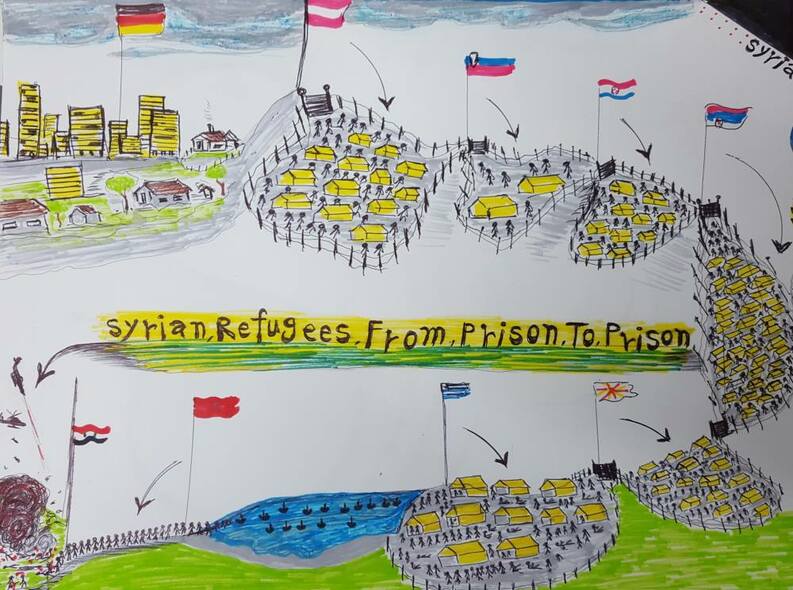The Youth Initiative for Human Rights – Croatia (YIHR Croatia) is organising a five-day Training on Social Integration for Young Political Leaders with a focus on social integration of refugees, minorities and migrants.
The training will take place in Belgrade, Serbia from May 10th to May 15th 2016.
The call is open for youth coming from youth political organisations and NGOs from Bosnia and Herzegovina, Croatia, Kosovo, Montenegro, Serbia, Hungary, Germany and France as well as other Council of Europe states.
Deadline for application is April 17th 2016.
The Training on Social Integration for Young Political Leaders will focus on social, legal and conceptual aspects of social integration of culturally distinct groups and individuals through lectures, workgroups, study visits to camps and asylums operating in Belgrade. Thus, it will be the first training of a kind in the region that will help transfer valuable knowledge from human rights experts and participants from countries that have developed efficient mechanisms of social integration, to politically active youth from countries that have only recently faced issues of social integration, due to the refugee and migrant crisis escalating in 2015.
Project background:
The region of Western Balkans is a specific type of polity where the Yugoslav federation has dominated for several decades and nations were for a long time living in one country under “brotherhood and unity” as a mantra in the 1990s started to fight one against another.
Today, wars ended but confrontation with the past and the implementation of transitional justice mechanisms still did not occur. Countries in the Western Balkans have great political, economic, and cultural potential that can be empowered by mutual cooperation, but without a thorough reconciliation process it remains unfulfilled.
Young people and future leaders engaged in politics still lack the experience of regional networking and cooperation, especially on sensitive issues. Hence, youth in political parties do not cooperate regionally with other politically engaged youth, other than those from ‘sister’ parties. This cooperation is thus limited to ‘ideological networks’. Through these networks, members get some contacts and training about political skills, but very little about human rights and post-war reconciliation. On the other hand, youth activists lack an insight into the political sphere and policy development. With this training we want to bridge those gaps.
Since the EU in its strategic plan gradually addressed regional development as crucial for the overall development of Europe, a ‘mainstreamisation’ of the human rights protection was triggered at a level of political proclamation. The EU accession of a part of the Western Balkans (Slovenia and Croatia) as well as the EU approximation of the rest of the countries of the region brought a new constellation of powers to the region. Suddenly, conditions for gathering politically and socially engaged groups and individuals, especially those less burdened by recent conflicts (as in this case, young politicians and activists), arose from common objectives and shared standards in human rights protection, policymakers’ professionalism and regional cooperation through legal and political framework brought by the EU accession.
However, the recent refugee and migrant crisis triggered by a series of (civil) wars on the Middle East and North Africa brought serious challenges to the European countries. A lack of cooperation among the leadership of neighboring countries in the Western Balkans led to huge humanitarian issues that struck the fleeing refugees and migrants, as well as a massive decline in international relations (especially among Croatia, Serbia and Hungary).
Ultimately, hundreds of thousands of refugees and migrants have entered and passed through the region of Western Balkans, causing diverse reactions among the local population and the political elites. This training is an urgent and appropriate response to a humanitarian and a human rights crisis of unseen proportions, but at the same time it is a strategically significant contribution to a culture of political and social cooperation and mutual respect among future leaders, engaged youth and policy-makers.
Objectives:
Short-term objectives:
(i) raise awareness on human rights issues (esp. inclusion of refugees, migrants and internally displaced persons) of young political leaders and activists in the Western Balkans
(ii) develop skills of young political leaders and activists on advocacy and campaigning for rights of migrants, refugees, minorities and vulnerable groups
(iii) develop analytical skills of participants for policy analysis
(iv) raise capacities for collaborative work in human rights campaigns on the local, national and regional level
(v) improve knowledge of participants about legal and practical aspects of social integration from experienced experts coming from countries with effective and developed integration mechanisms.
Mid-term objectives:
(i) spread the existing YIHR network of regional activists and advocates of human rights
(ii) raise awareness about humanitarian crisis and human rights violations in the region among politically active youth and in the public sphere
Long term objectives:
(i) foster interethnic and intercultural relations as well as peace-building in the region
(ii) raise capacities of involved organisations in the region
(iii) foster and consolidate regional cooperation among youth human rights NGOs and youth branches of political parties, which represents the core of YIHR’s regional success and mission.
YIHR will fully cover travel, food and accommodation of participants.
The training language is English.
Project partners:
Youth Initiative for Human Rights, Bosnia and Herzegovina
Youth Initiative for Human Rights, Kosovo
Youth Initiative for Human Rights, Montenegro
Youth Initiative for Human Rights, Serbia
(* drawing made by a boy from the closed sector of the Slavonski Brod camp, source: UNICEF Croatia Facebook)
Project carried out with the support of the European Youth Foundation


